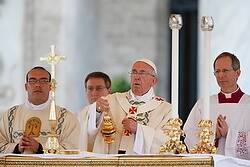In an essay titled "The Scentsory Adventure" from his book The Thorny Grace of It (a delightful recent gift), Brian Doyle writes: "You know what no one talks about when they talk about the Mass? The panoply of scents, the plethora of sensory adventures that enter through the doors of your nose, the layered and complex and lovely subtle messages you smell in Mass."
For instance: the sweet intricate tendrils of incense, and the cheerfully dank aura of raincoats and moist jackets and dripping umbrellas by the door; and the faint talcumpowdery smell of the three babies in attendance; and the sharp abrupt smell of matches and lighters as candles are lit; and the ancient dignified redolence of the wooden walls and organ and pews; and the faintest hint of mothballs and incense and cigar smoke as Father sails up the aisle like a battleship draped in layers of linen and cotton; and the deep tang of the wine and sturdy floury tastelessness of the wafer; and the leather friendly aftershaveish smell of your neighbor as he shakes your hand...
This is a marvelously clear and poetic description, but even as I relate to it, it strikes me how many cannot relate to it, or don't want to. And I mean lots of Catholics. Especially young Catholics. The lavish sights and smells, the abundance of sacramentals that evoke the mysterium tremendum and which so many of a certain generation conjure in memory: these seem to be distant and dissolving, exiled into the same territory as mastery of Latin, Greek, and Shakespeare.
I don't want to overstate the case. I don't want to speak for communities and parishes everywhere. When I was a law student at Notre Dame, every Sunday Mass at the Basilica of the Sacred Heart conveyed something of the "scentsory adventure" Doyle depicts. I recall similar experiences at Saint Francis Xavier College Church, on the campus of Saint Louis University. But, for example, most of the near-600 students at the Jesuit college prep where I teach, the majority of whom are Catholic, have never experienced what Doyle is talking about. And given trends, they might never.
This doesn't mean that all is lost. Students and faculty are inventive and creative, and they inspire devotion in new ways. And simple, unadorned spaces have their own appropriateness: The King of the World arrived in a manger, after all. Jesus preached on shorelines and in countrysides. God can meet us anywhere.
But there is something about the traditional experience of the Catholic Mass ("incense and all," as some put it) that nourishes the soul and elevates the mind in ways that are difficult to replicate elsewhere. How do we get it back?




